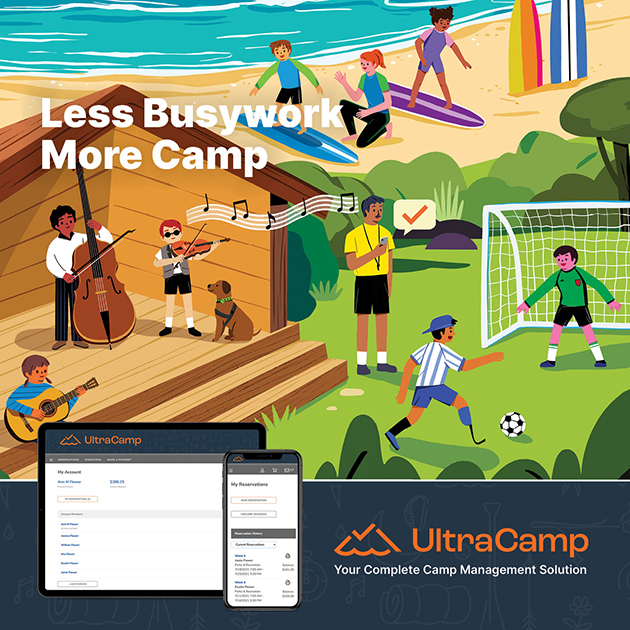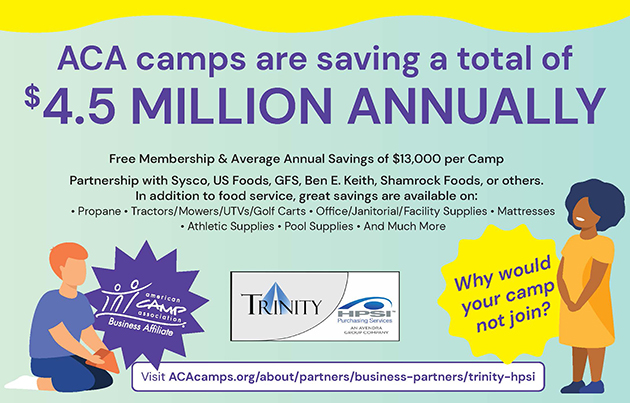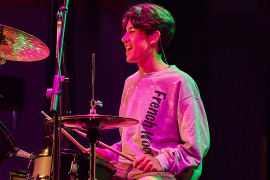Inclusion is a hot word in the camp industry — and it’s about time. We need to be very intentional about providing support for all our campers (and fellow staff). So how do we holistically serve the needs of our campers with invisible disabilities such as ADHD, anxiety, and others? What about female-identifying campers who enjoy more stereotypical male activities such as sports? How about male-identifying campers who hate sports? How about campers whose best friends are a different gender? What about our campers who come from outside of our main recruitment area? Do they truly feel included? Will they have an experience that leaves them wanting more? What about the “in the middle” campers, those who are not particularly loud or quiet? The ones who don’t get tons of attention as leaders or “favorites” — or needed attention from support staff. Do they feel included?
Why is this essential? We want all campers to have a transformative summer experience. From a business perspective, we want and need these campers to return.
What Does Inclusion Look Like?
Staff who were asked what inclusion looked like back in 2015 made some interesting assumptions. Some team members said that inclusion was all campers together around a campfire. They would be sure to talk to any campers sitting off to the side and coax them to join. But is that the wrong answer? Well, that depends on the why. Do those campers want to be in the group but not know how? Do they need some one-on-one support to join the group? Are their needs being met perfectly by allowing them to sit off to the side to take a sensory break to avoid overstimulation or fight social fatigue? Do they have a phobia of the campfire’s smell and want to listen from afar to the song session knowing that if their hair smells like campfire and they aren’t able to shower before bed it will be an anxiety trigger sure to lead to a sleepless night? The moral of this story is don’t make assumptions. And, spoiler alert, if you are asked this question at your camp staff training, there is no “right” answer.
What Does Inclusion Feel Like?
I love this open-ended question, and the rich discussions that follow, because the answers are as varied as the campers (and staff) themselves. Simply put, inclusion is meeting the varied needs of your community members. Think carefully about which campers are at higher risk of not being included, and then proactively plan ahead so that they are an integral part of the holistic inclusion approach.
Right-Size Your Expectations
“Ages and stages” are a critical topic in training for camp. It’s important to know what is expected for six- to seven-year-old campers. They will likely need some appropriate help and guidance with self-care such as showering and teeth brushing. Similarly, it’s essential to expect your teen and maybe even some preteen campers to be very curious about romantic relationships, kissing, sex, drugs, and alcohol — and they will often ask you, their camp counselors, related tough questions that they would never ask their parents. You should be prepared.
Unfortunately, developmental stages aren’t that cut and dried. Some six-year-old campers will be very independent, and may find reminders about how to effectively brush their teeth really annoying. Likewise, some of your teen campers won’t be developmentally ready for talks about sex and romance. If they feel uncomfortable about such discussions, this could show up in what appears to be some odd behavior when these topics pop up in your cabin. Knowing what each camper is capable of is essential in meeting their needs and having appropriate expectations. It’s imperative in making sure that camp is accessible to all campers so that even those who don’t follow the development milestone charts truly feel included. This is one of the reasons why great camper intake and notes from previous summers are such a vital tool!
Explicit Bias
Bias is a popular buzzword of our time and for good reason. It’s important to examine what biases we all hold (yes, you have them too). Sometimes a bias is obvious. You work with a camper who you find is super annoying — or perhaps their moods and quirks trigger your own anxieties or frustrations. This is obvious to anyone around you, and, unfortunately, it’s likely obvious to the camper as well. Here is where you “tag in” a co-counselor or another supervisor if one is available to you. There is no need to beat yourself up. You are human, and you will continue to be human even after a week or two of excellent staff training. Awareness is key. If you are aware of your bias in this case, you can work on it. Now’s the time to really be creative and find one thing you admire about this kid. It could even be the thing that triggers you the most, such as their stubbornness. This kid knows what they want and advocates consistently. Just this one shift in mindset could enable you to see more positive traits in this camper and lead to a more genuine connection.
Implicit Bias
This one is trickier. But again, we all have it. Bias is implicit when it is ingrained so deeply in us that we don’t know it’s there. Maybe a fellow staff member “red-flagged” a child, so you subconsciously assume the worst before getting to know them. Maybe you spend a session assuming that that child sitting to the side of the campfire wants to be there, so you just let it go, never taking the time to actually talk to them to make sure they feel included? To cut down on leading with implicit bias, make a habit of frequently asking yourself, “Is this child feeling included? Am I practicing holistic inclusion here and making sure that I’m meeting all the campers’ needs, even the kids who appear at first glance not to need any extra support?”
Before Camp Begins
What can you do before camp starts to make sure you’re practicing holistic inclusion? Take a moment and either visualize or list out all the camper “types” you expect to encounter this summer. (Yes, I’m aware that I’m asking you to stereotype camper personalities. I know that you are aware that you could never come up with an exhaustive list during this exercise and that every child is a unique individual.) After you have these “personality types” in your mind or on paper, determine which groups may be at highest risk of not being included. Next, brainstorm with other staff how to proactively handle this.
Here is an example from a camp whose programming was mostly bunk based; therefore, children socialized only with other peers of the same gender most of their camp day.
There was some concern among staff, parents, and the campers themselves, that some campers weren’t having the ideal camp experience. This included girls who loved sports and boys who hated sports. The camp staff came up with a plan to blend “sister and brother villages” together two mornings a week and to allow the campers to choose among all of the assigned bunk activities. Many of the campers happily stayed in activities that were more “expected” for their genders at this conventional camp: boys played sports, while the girls stuck to the creative arts. However, a small group of thrilled campers had the opportunity to participate in favorite activities that they otherwise would have missed out on. This program change went so well that the camp permanently expanded activity choices — a big shift from its more traditional bunk activity model. And they saw a direct correlation between smiling campers and camper retention in their middle school-age programs.
During Camp
What can you do during camp to make sure there are no “in the middle” campers who quietly aren’t getting their needs met? Take a moment and, without any records in front of you, list the campers in your age group, cabin, or even camp (depending on the size, of course). Pay attention to the campers whose names aren’t top of mind. Spend some intentional time to really observe those kids and talk to them to make sure they are feeling included. Don’t make assumptions based solely on an activity “looking inclusive.” Remember, there is no such thing.
How Do You Ensure That You’re Not Showing Explicit Bias?
This one is simple yet difficult. Listen. Be truly open to feedback from your supervisors, co-staff — even the campers themselves. If campers complain about not getting to go first or others being favored, before you dismiss this as whining (and it may be), take a moment to examine what they may be attempting to communicate to you. Ask them one on one; kids and teens can be incredibly insightful about their own behavior. Do not leave them out of the conversation.
How Can You Ensure That You’re Not Showing Implicit Bias?
This is a process, so just keep trying. Yes, camper intake, notes from past summers, even a conversation with last year’s counselor are all important. Listen, reflect, and ask questions. Make sure that you use all of those notes to plan ahead. But also leave space to form your own conclusions. As an educational and behavioral professional for the past 20-plus years, I’ve found time and time again that someone else’s “problem child” becomes one of my favorites. Yes, you will have favorites. Remember you are human both in and out of camp. Just keep these distinctions to yourself.
Final Thoughts
My final message to share is one of grace. I still find myself harboring some biases about children, teens, or even other adults I work with. I take a moment (or more) to examine these biases and ask myself questions, then I forgive myself for not being perfect and try again. You can do the same.
|
Discussion Questions
|
Franki Bagdade is an academic and behavioral consultant in her business, FAAB Consulting. Franki has a master’s in special education and a master’s in clinical social work. She has been working with children and teens with “extra needs” for over 20 years. Franki served on the director teams of one of the largest residential camps in North America from 2015–2020. She provides professional development for camp staff, educators, and mental health professionals. Franki speaks nationally on mental health topics, inclusion, and parenting. Her book, I Love My Kids But Don’t Always Like Them! hit bookstores in the fall of 2021 and details how she took what she learned from the classroom and the camp cabin and translated it into parenting three very different children. Franki is a contributing author for Metro Parent Magazine (Metro Detroit), Chicago Parent, Autism Parenting Magazine and Today (show) Parenting, as well as her own FAABlog. For daily tips and tools, follow her at facebook.com/faabfranki or visit her website at faabconsulting.com.



